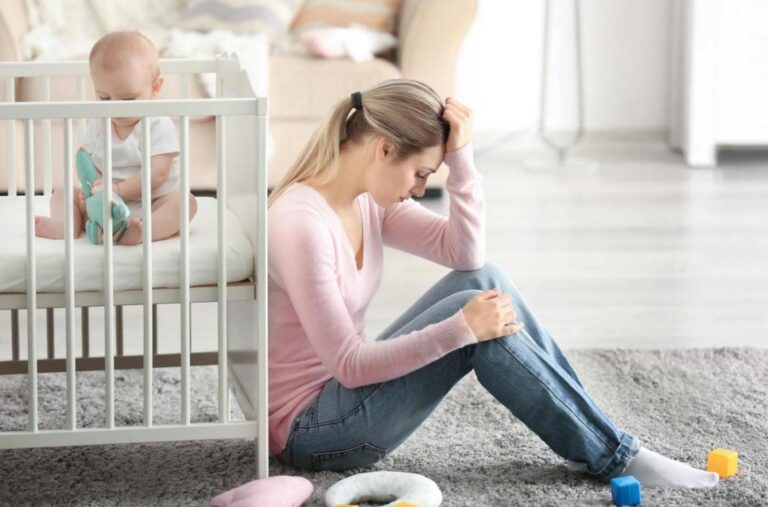Newborn babies are called bundles of joy because they trigger happiness in the whole family. Holding your child in your hands and looking in its eyes is supposed to be thrilling and fulfilling. But sometimes, all these excitements may be overwhelming for a mother until she develops depression.
Postnatal depression (PND) or Postpartum depression (PPD) is a very common but abnormal illness that many parents experience after giving birth. Even though it mainly affects women, it can also affect dads and partners (this is very rare.)
Postpartum depression signs and symptoms
Even though it’s a very common condition that affects at least one in every 10 women within a year of giving birth, most patients don’t even know that they are patients. The following are some of the postnatal depression you should know.
- Having sleepless nights
- Nightmares
- The feeling of unworthiness and that you don’t deserve to be your baby’s mother.
- You don’t want to hold your baby
- Crying frequently for minor or no reason
- Suicidal feelings
- Sick fantasies like thinking about killing your baby
- You think you are a failure
- Frustrations, irritability and restlessness
- Low self-esteem
- Trouble bonding with the baby.
- Fatigue decreased energy and motivation.
- Lack of interest or pleasure in usual activities.
Most people often confuse Baby Blues with PND. Baby Blues have almost the same symptoms as PND, but the symptoms always go away on their own 15 days after delivery while the symptoms of PPD may persist for a very long time. Some say PND is a severe version of baby blues.
Causes postnatal depression
Although the real cause of depression after baby is not known, it is believed to be triggered by the following conditions;
Depression history
A person who has a history of mental health problems or has ever received depression treatment is at a higher risk of getting Postnatal depression than a normal person.
Difficult child birth
If you endured a difficult delivery, like for example you underwent caesarean section, then there is a likelihood that you will develop postpartum depression.
Financial constraints
A mother who is going through tough economic times is likely to develop depression after birth.
Unplanned pregnancy
An unplanned baby is not only stressful, it can also cause post delivery stress. And by this, I mean also those babies that come because of rape.
A recent stressful life event
A person who has had a miscarriage before getting pregnant again for the baby may be overwhelmed by emotions that can trigger post-delivery depression.
Violence
Violence against women increases the chances of postpartum depression. Any kind of violence including physical, emotional or psychological will cause post-natal depression.
Smoking
Tobacco has got many negative side effects including causing depression. The depression can be so bad to an extend of causing suicidal thoughts.
Treatment and Support
Most women don’t know they have postpartum depression because it develops gradually. Most of those who have the condition don’t want to come out and seek help because of fear of being judged. It is important to understand that whatever your going through is not your fault. And being depressed doesn’t make you a bad parent.
Talk to someone
Telling a member of your family or your friends about your condition helps a lot. This will help them understand you better and know what they can do to help. they can create time to be with you so that you don’t feel lonely to an extend of getting those suicidal thoughts.
Take enough rest
Rest is very crucial for new mothers who want to rebuild their strength. It is very difficult to get enough rest during this time because you have to attend to your baby and that’s what causes irritability. You need to find time to rest even if it means leaving your baby under the care of another responsible person.
Stay healthy
Your health and that of your new born baby should be your top priority during this time. Stay on top of all your healthcare appointments and follow your doctor’s instructions for the safety of both of you. An illness can trigger stress which leads to PPD. In line with staying health, you must also ensure that your diet is nutritious. You should eat a balanced diet that contains all the necessary minerals.
Join a PPD support Group
As I stated earlier, this illness affects a big number of people and finding people with similar problem really helps. There is nothing as relieving as knowing that you are not alone. It gives you a sense of hope. In a support group, you will find moms who have survived PPD. They will give you tips on the dos and don’ts. In my opinion, this is the best treatment for PPD.
Exercise
Exercising is difficult for some people but trust me when I say it helps. You don’t need to go hard on yourself by lifting weights in the gym. Just start with taking outdoor walks. A change of scenery and the fresh hair will keep your emotions in check. Engage in other simple physical activities that are not so demanding.
Talk to a professional
If symptoms persist even after trying out the above remedies, then it is time to talk to a psychotherapist. A psychotherapist is an individual who has been trained to find solutions to mental illnesses without use of pharmaceuticals. They do this by establishing a relationship and then working together with the patient to find the solution. The good thing about psychologists is that they will know how to handle you.
Medication
Treatment of PPD using antidepressant drugs should be the last option because of the side effects associated. Some drugs can affect babies if used by breastfeeding mothers. You should talk to your doctor who will make the right decision and give you the best prescription. Most often the side effects are always overlooked if the condition is causing grave danger to mother and baby.
